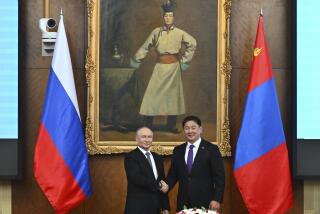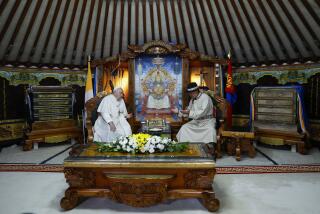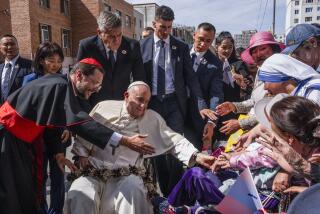Mongolia Reaps Praise From Bush
ULAN BATOR, Mongolia — Calling the U.S. and this emerging democracy “brothers in the cause of freedom,” President Bush on Monday capped a weeklong Asian tour with a highly symbolic visit to a strategically placed ally.
Bush’s journey to Mongolia, with its potholed streets and rundown Soviet-era architecture, lasted just five hours. But it was long enough to make a statement of U.S. support that could resonate for years in a oncecommunist country that has fallen increasingly under the influence of China, its southern neighbor. Russia, directly to the north, also exerts power.
The trip handed Bush an ideal backdrop for his latest defense of the Iraq war, because Mongolia contributes about 160 troops to the U.S.-led coalition. Though the war and Bush’s foreign policy have provoked anger in many nations, the United States remains relatively popular in Mongolia and other nations ruled by communism until the fall of the Soviet Union.
With a population of just 2.8 million, Mongolia has the third-largest troop contingent in Iraq on a per-capita basis, Bush administration officials said.
“Free people did not falter in the Cold War. And free people will not falter in the war on terror,” Bush said, a subtle reference to critics at home who have called for a pullout of U.S. troops from Iraq.
“We see the determination to live in freedom in the courage of Iraqi and Afghan citizens who defied the terrorists to cast their ballots,” Bush said, speaking to several hundred Mongolian government officials and decorated soldiers in a spartan government auditorium. “ ... And we have seen it in the daily courage of the Mongolian people, who claimed their freedom 15 years ago and are now standing with others across the world to help them do the same.”
Bush, standing before a bright collage forming the U.S. and Mongolian flags, peppered his remarks with traditional Mongol greetings. President Nambaryn Enkhbayar thanked Bush effusively for his visit, the first by a U.S. president, saying that it showed the world that “small countries like Mongolia do matter.”
Bush’s brief stay was steeped in Mongolian culture. He met with Enkhbayar in a traditional ger, similar to a yurt, in the courtyard of the main government building.
Looming behind the two leaders was a statue of the legendary 13th century Mongolian warlord Genghis Khan.
Later, with temperatures hovering in the single digits to low teens, Bush joined Secretary of State Condoleezza Rice and First Lady Laura Bush at a presidential retreat outside town.
There, festivities took place inside cozy gers, which look like tents from the outside but are highly decorated inside. Surrounding them were Mongolian warriors in battle gear, grasping swords. Camels, cows and yaks wandered nearby.
In one ger, heated by a wood-burning stove, the first couple met a Mongolian family that lived nearby. Bush sampled fermented mare’s milk, downed tea and tasted cheese curd. Dancers dressed in elaborate costumes performed as a gong was sounded. And traditional throat singers, who create more than one sound simultaneously, impressed the first couple.
Bush did not, however, receive the horse typically bestowed on visiting dignitaries. U.S. officials had made it clear that the president did not desire such a gift. Local officials had given a horse to U.S. Defense Secretary Donald H. Rumsfeld, who visited several weeks ahead of Bush. The horse remains in the country but still belongs to the defense chief.
Bush joked Monday that he had come on an “important international mission.” “Secretary Rumsfeld asked me to check on his horse,” he said.
The Mongolians spared no expense, perhaps in hope of a payoff. The Bush administration’s Millennium Challenge Account program is weighing a Mongolian application for hundreds of millions of dollars that would help improve transportation infrastructure and other projects.
Analysts say some Mongolians might be unreasonably optimistic that Bush’s visit means such grants are a sure thing. Though power has shifted peacefully between government and opposition parties in recent years, corruption remains a concern and the economy is sufficiently shaky that U.S. officials might decide that Mongolia is a poor investment.
China’s growing influence here is of concern to both Mongolia and the U.S., whose influence in Asia has ebbed in recent years. China is the source of most consumer goods here. It’s also a voracious consumer of Mongolia’s resources.
Bush’s warm welcome marked a contrast to most of his stops over the last week. In Japan and South Korea, where public opinion has turned steadily against the U.S., the governments are considering troop reductions in Iraq. And the visit to China was dominated by differences over trade and human rights.
But it was evident from the local English-language newspaper, the Mongol Messenger, that Mongolia would provide a welcome respite. A front-page story announcing a “rowdy student protest” in Ulan Bator, the capital, detailed concern over a local issue: bus fares.
*
Wallsten reported from Ulan Bator and Magnier from Beijing.
More to Read
Sign up for Essential California
The most important California stories and recommendations in your inbox every morning.
You may occasionally receive promotional content from the Los Angeles Times.










